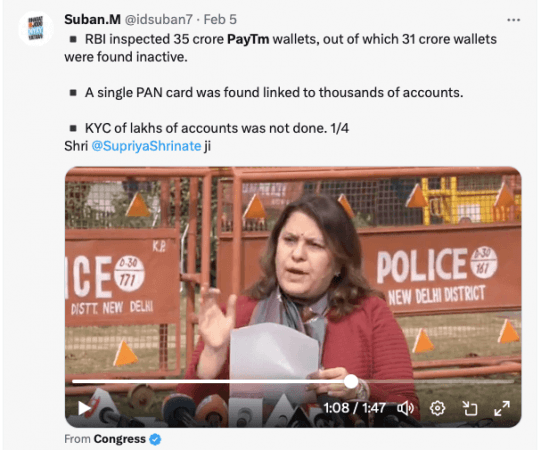
For anyone who has experienced the convenience of a digital wallet, knows all too well the ubiquity that Paytm has acquired in India in the past decade. From a small town cart seller to a big time supermarket, the Indian fintech company has been a generic name of sorts for UPI transactions.
However, last week the bubble surrounding the multinational company burst, when The Reserve Bank of India announced a series of regulatory measures against the Paytm Payments Bank. Citing several serious violations, under Section 35A of the Banking Regulation Act, 1949, it barred the Paytm Payments Bank from accepting any deposits, undertaking credit transactions in customer accounts, wallets, FASTags, and others, after February 29. The regulatory action follows a comprehensive audit report and subsequent validation report of external auditors which reveal "persistent non compliances and continued material supervisory concerns."
Soon after the news broke, confirming all the fears and cautionary warnings about the company that had hitherto been making hushed rounds, shares of One97 Communications tanked by 42.35 per cent in the first five days. One97 Communications runs Paytm services and holds a stake of 49% in the payments bank.
The big questions, bigger issues
Amidst speculations flying around, financial influencers remarked how there's no denying that there's a lot more to the story than meets the eye. The problem is not the long and exhaustive list of noncompliances by Paytm, the problem is that it had the confidence to disregard past RBI warnings and carry forward with such business practices for seven whole years without being held accountable. Lakhs of dormant accounts, accounts flouting KYC norms and single PAN card being linked to multiple accounts is what led to RBI scrutiny. The expose also gives rise to major concerns money laundering as in many cases total value of transactions ran into crores of rupees.
Why did they get such a long rope for seven years: Congress
On Monday, the Congress questioned the Enforcement Directorate over its silence and how the violations by Paytm were not an overnight development. In a press conference, Congress leader Supriya Shrinate asked, "We'd like to know the Centre's stand on the issue. Why is the ED still silent on the matter, as opposed to its prompt actions on Opposition leaders? As per news the RBI bank, 35 crores wallets were scrutinized and 31 crore were found inactive. One PAN card was linked to a 1000 accounts. False accounts and annual reports being furnished to the bank." She added further in context of the company's owner Vijay Shekhar Sharma, "It's very important to ask here that in the past there have been serious allegations of BJP's association with Paytm. The owner published ads of PM Modi, selfies are being taken with him, and when he's there for you, then where's the fear of law?"

Founder denies allegations, 'sounds' confident
After the RBI brought the company's operations to a grinding halt on January 31, asking it to stop accepting further deposits, or top ups on customer accounts, wallets, FASTags, prepaid instruments or conducting any further transactions after February 29, it's founder Vijay Sharma was quick to give the impression of it's business as usual. "Your favorite app is working, will keep working beyond 29 February as usual," he posted on X on February 2. The post further read, "I, with every Paytm team member, salute you for your relentless support. For every challenge, there is a solution and we are sincerely committed to serve our nation in full compliance."
Not the first time Paytm is on the wrong side of law
Soon after the news, social media was abuzz with past violations by the company. Recently enough in October last year, the central bank had slapped a fine of Rs 5.39 crores due to deficiencies in regulatory compliance. A year before in March 2022, the RBI had directed the fintech company to put a stop to, "onboarding of new customers with immediate effect." This apart from the countless incidents of cyber security breaches, disruptions, retail complaints making it to social media on a regular basis.
Any possible actions by RBI will now impact both customers and merchants, considering the fintech company claims to have over 300 million wallets and 30 million bank accounts, and around 100 millions KYC customers. The bigger the numbers, the more concerning the violations and larger the repercussions on the common man.














